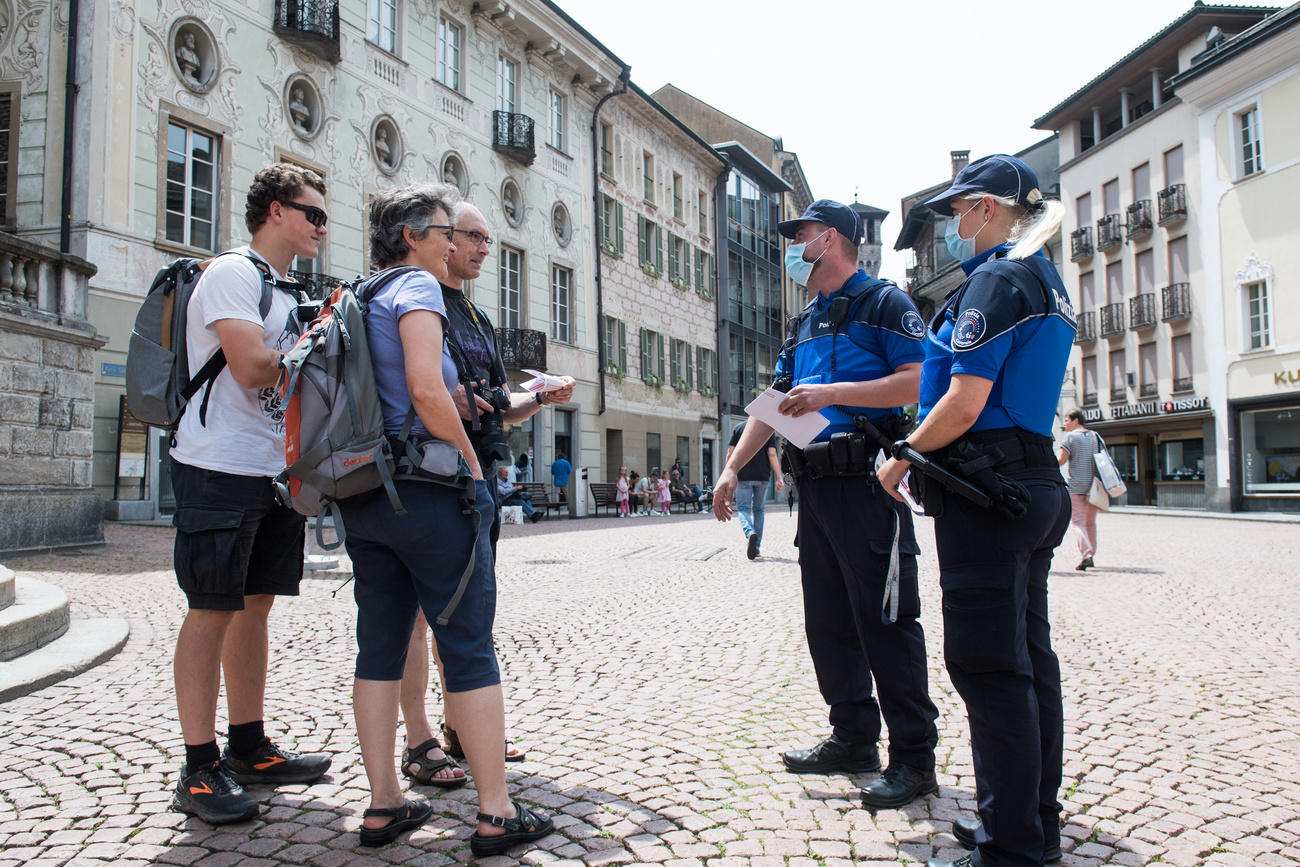
Government announces major easing of coronavirus restrictions

The Swiss government has announced a significant relaxation of restrictions and, as of June 19, an end to the "extraordinary situation" to deal with the coronavirus crisis.
It said this was made possible by the low number of new infections in recent weeks. Interior Minister Alain Berset, who holds the health portfolio, said they were now around only 20 per day.
An end to the extraordinary situationExternal link means powers will be handed back to the cantons. Simonetta Sommaruga, who holds the rotating presidency this year, told a press conference on Wednesday that parliament would also be responsible for deciding on coronavirus restrictions.
“We have managed to get the virus under control,” said Sommaruga, and extended thanks to “everyone who has made it possible”. “The rate of infection is low, the shops are open and the hospitals are ready,” she told the press conference. So it was now a question of moving to a “new normal” in which the responsibility for ensuring continued protection was on businesses and employers.
Free movement of people will be restored throughout the Schengen area by July 6, Justice Minister Karin Keller-Sutter told the press conference. Swiss companies will also be able to recruit from the European Union, EFTA and third countries from June 8, under certain conditions.
Borders with Germany, Austria and France will be open for tourism and professional visits from June 15, she said. However, although Italy has announced it will open its border on June 3, Keller-Sutter said Switzerland was not yet ready to open to Italy on that date, but it was maintaining contacts to ensure a coordinated approach.
+ What’s happening at Swiss borders and airports?
Gatherings
As of May 30, spontaneous gatherings of up to 30 people such as football matches and picnics will be allowed. Public events gathering up to 300 people and all leisure and tourism activities can resume on June 6. These include cinemas, theatres, swimming pools, zoos, campsites and group excursions.
Rules are also being eased for restaurants. Table numbers will no longer be limited to four, but if there are more people, guests must leave a contact in case tracing becomes necessary. Tables must still be two metres apart.
Berset stressed the continued need to follow hygiene and social distancing rules, as well as the need for contact tracing.
Older and vulnerable people
Berset said older people can now “resume a social life” and see their grandchildren. He said they had been able to stay at home because of support extended by others and that this “solidarity” should help them return to public life.
With regard to at-risk employees, he said employers should continue ensuring protection and allowing them to work from home, or guarantee their salary if this is not possible. For other employees, he said the government still recommends home working, which also eases the transport system, but that it would be up to employers to decide.
Goodbye Mr Coronavirus
Berset said this was an “ambitious plan” but that “we remain pragmatic”. He said it was also too soon to allow large events likely to draw more than 1,000 people, which remain banned at least until the end of August.
He also used the press conference to thank Daniel Koch, the head of communicable diseases at the Federal Office of Public Health (FOPH), who has become a key figure in the government’s crisis management. Koch is to retire, having delayed his retirement because of the crisis.
+Who is Switzerland’s ‘Mr Coronavirus’?
Berset praised Koch’s “unwavering commitment”, saying he had participated in every cabinet press conference and 21 expert ones “each time with a new tie”.
“I hail his scientific knowledge, his capacity to explain things simply and his modesty in the face of a virus about which we knew very little at the start,” said Berset.
Cantons welcome end of emergency
The Conference of cantonal governments welcomed the decision to end the emergency situation on June 19, saying cantons were capable of deciding appropriate measures on a regional basis.
The epidemiological situation is very different from one canton to another, according to the Conference president Benedict Würth, and the maintenance of nationwide rules is no longer appropriate.
He said the advantages of the Swiss federal system should be used to ensure that appropriate measures were taken according to the local situation on the ground.

In compliance with the JTI standards
More: SWI swissinfo.ch certified by the Journalism Trust Initiative




























You can find an overview of ongoing debates with our journalists here . Please join us!
If you want to start a conversation about a topic raised in this article or want to report factual errors, email us at english@swissinfo.ch.